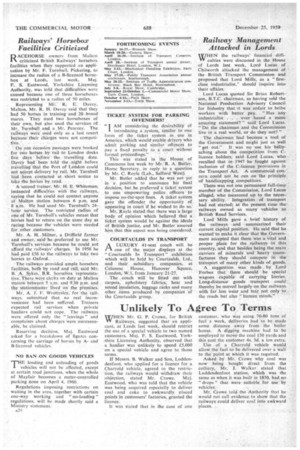Unlikely To A gree To Terms
Page 26

If you've noticed an error in this article please click here to report it so we can fix it.
WHEN Mr. G. P. Crowe, for British Railways, suggested that ark applicant, at Leeds last week, should restrict the use of a special vehicle to two named customers, Maj. F. S. Eastwood, Yorkshire Licensing Authority, observed that a haulier was unlikely to spend 15,000 on a special vehicle and agree to those terms.
If Messrs. B. Walker and Son, Luddendenfoot, who applied for a licence for a Charrold vehicle, agreed to the restriction, the railways would withdraw their objection, stated Mr. Crowe. Maj. Eastwood, who was told that the vehicle was being acquired especially to deliver coal and coke to awkwardly placed points in cuStomers' factories; granted the licence..
It was stated that in the case of one
customer, who was using 70-80 tons of fuel a week, deliveries had to be made some distance away from the boiler house. A digging machine had to be employed to move the coal 150 yards and this cost the customer 4s. 3d. a ton extra.
Use of a Charrold vehicle would allow the fuel to be delivered over a wall to the point at which it was required. Asked by Mr. Crowe why coal was now being bought direct from the colliery, Mr. J. Walker stated that Luddendenfoot station, which was the same as when it was built in 1850, had no "drops" that were-'suitable for use by vehicles.
Mr. Crowe told the Authority that he would not call evidence to show that the railways could deliver coal into awkward places. •
















































































